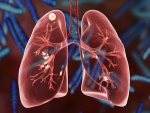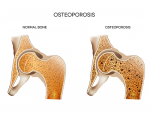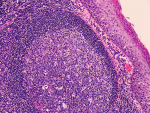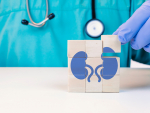Displaying items by tag: department of medicine
Sickle cell disease is the most common and clinically significant inherited blood disorder across the nation, and now there is an FDA-approved gene therapy to help those living with SCD.
Tuberculosis, the world’s leading infectious disease killer, caused 1.6 million deaths in 2021, along with 10 million new cases of tuberculosis every year.
Tagged under
Vivek Lal, M.D., associate professor in the Department of Pediatrics at UAB Heersink School of Medicine and the founder of both ResBiotic Nutrition and Alveolus Bio, was given the 2023 Award for Excellence in Entrepreneurship.
Tagged under
- release
- harbert institute for innovation and entrepreneurship
- school of medicine
- department of pathology
- department of pediatrics
- department of urology
- department of medicine
- division of pulmonary allergy and critical care medicine
- department of biochemistry and molecular genetics
- college of arts and sciences
- department of biology
- department of chemistry
- school of engineering
One UAB experts says the roles of screenings, warning signs and a healthy lifestyle are all keys to cancer prevention.
Tagged under
After a loved one receives a breast cancer diagnosis or surgery, it is important for caregivers and support partners to know how they can best help the patient during the difficult time.
Tagged under
The academy provides a forum where knowledge and skills are developed and refined to support community leaders as they conduct planning and improvement projects, balance needs and resources, and secure funding that ignites change.
Tagged under
Tagged under
Analysis of a survey of 18,041 people in rural KwaZulu-Natal revealed a discrepancy between the ability of the South African health system to respond to the health needs of people with communicable diseases and the health needs of people with non-communicable diseases.
Tagged under
Tagged under
The Blazer Bridge Fund is intended to identify and assist in the development of promising ideas, discoveries, innovations and/or technologies from UAB faculty and staff that have commercial potential.
Tagged under
- release
- harbert institute for innovation and entrepreneurship
- school of education
- school of engineering
- school of medicine
- department of otolaryngology
- department of anesthesiology and perioperative medicine
- department of microbiology
- department of medicine
- division of hematology and oncology
- division of pulmonary allergy and critical care medicine
- division of gerontology geriatrics and palliative care
Lung-resident memory B cells produced during influenza are long-living immune cells that migrate to the lungs from draining lymph nodes and lie in wait as early responders that can quickly react to future infections. They are key sentinels against subsequent viral variants.
Tagged under
UAB researchers make a case for utilizing telehealth technologies in the care of injured rural patients stating that teletrauma can improve access to trauma care for rural patients.
Tagged under
Since 1985, the Coronary Artery Risk Development in Young Adults study has examined the factors that contribute to the development of cardiovascular disease to better understand the natural history of cardiovascular disease over the adult life course.
Tagged under
These results add an additional, mechanistic aspect to further explain how the decades-old blood pressure medication verapamil can preserve beta cell function in Type 1 diabetes patients by affecting the hormone insulin-like growth factor 1.
Tagged under
The study, funded by the Patient-Centered Outcomes Research Institute, will compare two pathways of post-fracture patient care.
Tagged under
Some PD-1+CXCR5+CD4+ T cells will become germinal center-Tfh cells that are essential for B cells to become high-affinity antibody-producing cells. Others do not take that path, instead becoming memory T cells.
Tagged under
$46 million awarded by NIH to UAB and partners allows researchers to continue following participants enrolled in the national Multicenter Osteoarthritis Study.
Tagged under
The newly introduced kidney function equation has value in predicting heart failure comparable to the old equation but may reduce racial disparities by improving access to heart failure therapy among Black heart failure patients.
Today the National Institutes of Health has announced that UAB’s own Jeanne Marrazzo, M.D., has been selected to succeed Anthony Fauci, M.D., as the next director of NIH’s National Institute of Allergy and Infectious Diseases (NIAID) this fall.
Tagged under
IN8bio has opened a new Birmingham facility, a 10,000-square-foot advanced research and development laboratory in the Martin Biscuit Building at Pepper Place.
Tagged under



















